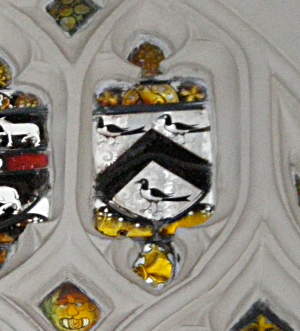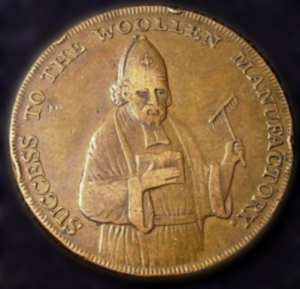
Samuel Kingdon, merchant & "Iron Sam" Kingdon, foundry owner
Return to Exeter People Menu
Garton and King, one of Exeter's oldest, still trading companies, was run by "Iron Sam" Kingdon during the first part of the 19th century. Born in 1779, to Samuel Kingdon Sr and Jane Kent, he took over and then transformed the business of his father, from wool to iron foundry. He built the largest iron foundry in the west of England, while 'Iron Sam's' cousins, founded a successful wallpaper and upholstery business in the city.
Samuel Kingdon
Although there were Kingdons established in the city before the end of the 16th century, Samuel Kingdon Sr was from a Thorverton branch of the family. He was born in 1745, to a family of established serge makers. A fire insurance valuation of his fathers property and business in Thorverton from 1758 indicates that they were well established in the town. The insurance inventory listed two dwelling houses, a pound engine and mill, livestock, a barn and other buildings to a total value of £400.
Samuel Kingdon was apprenticed to Mr Coffin in Exeter. In 1768 while he was living in the house of Mr Coffin, he purchased the business at the sign of the Golden Hammer in Exeter ".... he has taken the house with the stock-in-trade in which Mr. William Britnall lately lived at the sign of the Golden Hammer, four doors above the Conduit in Fore Street, where he sells all sorts of ironmongery and haberdashery goods, wholesale and retail." He married Jane Kent in the same year.
The Exeter Halfpenny
In 1787, he expanded his business by opening a warehouse in Theatre Lane from which he started to manufacture fire grates and simple cooking ranges. He was responsible for issuing, in 1792, the well known Exeter halfpenny which was engraved with the legend, "Payable in the warehouse of Samuel Kingdon" and "Success to the woollen industry". Such coins were commonly issued by traders to offset the shortage of small coins of the realm, and to tie the local customers to a particular merchant.
Samuel Kingdon Sr died in 1797, just at the collapse of the woollen industry, partly caused by the Napoleonic wars and was buried in the Dissenters Burial Ground by Bull Meadow. He left his business in the hands of his wife and two sons, William and Samuel.
The inscription on his obelisk shaped tomb reads "Beneath this monument are deposited the remains of Mr Samuel Kingdon of this City who died Oct 30th 1797 aged 52. Also his wife Mrs Jane Kingdon who died March 8th 1816 aged 69".
'Iron Sam' Kingdon
"Iron Sam" Kingdon was born in 1779, and was baptised in the Unitarian, George's Meeting House. He joined the family business, now run by his mother and older brother William after their father's death. In 1803, during the Napoleonic emergency he was appointed Captain of a Company of Artillery of Exeter volunteers.
He married Sarah Eyre a merchants daughter from Sheffield, in the Anglican St Petrock's Church, as only marriages in a parish church were legal. The couple moved to 26 Southernhay, and their first of eight children, Jane, was born in 1806.
The business prospered and the foundry was involved in supplying 'ironwork over the balcony' at Rougemont House in 1805 for the owners, Edmund and Mary Granger; Granger, a wine merchant, was also a partner in the Banfill and Granger woollen factory at Exwick. The foundry was also involved in the building of James Green's new St David's Church during 1816, that would become known as the pepper pot. He and his brother William took sole charge of the business when their mother Jane, died in the same year. Another important contract, in 1840, was for the West of England Fire and Life Insurance Company.
Samuel Kingdon was instrumental in establishing the Exeter Tradesmen's and Mechanics' Institution in 1825, at Bell Hill (now South Street). The Institute, which had a membership of 200, incorporated a library that housed books that were not deemed to be controversial on theology or politics. One opponent of the Institute, John Cooke wrote ".... take away men from their enjoyment of cakes and ale and you will take away their seven senses".
Although 'Iron Sam' was said to have a harsh voice and forthright manner, he was also a good employer, and in 1836, workers from S and W Kingdon were "treated by their liberal employers to a well supplied and substantial dinner". Despite his reputation as a rather rough and uncultured man, he was an active member of the Devon and Exeter Institution in Cathedral Close, and his descendants were still members of the Institution in the 1970s.
In 1835, 'Iron Sam' and Sarah moved to Duryard Lodge, a house that was described at the time as rather plain in appearance, but prints of the building from the sale catalogue of 1865 shows a rather elegant building with a run of cast iron balconies across the front, no doubt produced by his foundry. Lodge Hill, a small cul-de-sac off New North Road is the remnant of the drive that led to Duryard Lodge from Cowley Bridge Road. The house was sold in 1865 to Richard Thornton West, and rebuilt as Streatham (Reed) Hall.
'Iron Sam' becomes Mayor
After the Municipal Corporations Act of 1835, party politics became more prominent and Samuel Kingdon became the first Conservative Mayor of Exeter a year later. Although politically Conservative, Iron Sam was still a Unitarian at heart, and was criticised for appearing "unrobed and undistinguished by distinctive badge of office"; he is said to have reported that "for his part he did not like the petticoat sort of things worn on such occasions".
His election was accompanied by a Tory coup to take full control of the council, despite the recently introduced reforms, and the Reformers amongst the Liberals refused to attend the dinner for the newly elected mayor. Treading carefully because of his Unitarian origins, which in an earlier age would have prevented his participation in public office, Iron Sam did not prove to be a reformer, and he later developed into staunch Church of England, to match his carefully crafted political leanings.
The city's municipal silver was sold by public auction, in 1837, as the council was going through an economy drive. Mr T E Drake and others, purchased a silver salver that had been given to the chamber by two prominent merchants of Teignmouth in 1757. Later the same year, as the first post reform mayor, Samuel Kingdon was presented with the salver, at the New London Inn. The salver is now back in the City's collection of silver plate, and still used for hospitable occasions.
In 1849, Samuel and his brother William retired and the business sold to become Garton & Jarvis. "Iron Sam" retained an office in Cathedral Yard "...where his acquaintances used to drop in and chat and he did much business as he had property all over the city." (Mrs F E Baker, granddaughter) He died at Duryard Lodge on 14 January 1854 at the age of 75 years and was buried in the churchyard at St David's.
Source: The Kingdon Family - a Second Look by A S Kingdon the Golden Hammer by S E Ellacott and the Westcountry Studeis Library.
 The
Kingdon Arms in St Martins Church
The
Kingdon Arms in St Martins Church
 A Samuel Kingdon issued halfpenny.
A Samuel Kingdon issued halfpenny.
│ Top of Page │